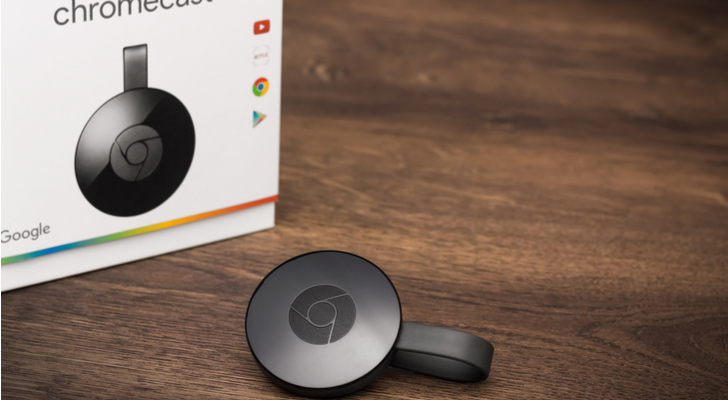Don’t misread the message. Alphabet (NASDAQ:GOOG)(NASDAQ:GOOGL) still effectively “owns” the internet, with its Google arm facilitating 86% of the world’s web searches. And, GOOGL stock has been one of the market’s most reliable winners for investors willing to stick with it for the long haul.
But Alphabet is anything but infallible. It had an opportunity to become a dominant player in the streaming television market and just didn’t.
It’s not the end of the world. Indeed, Alphabet may well make a more concerted effort from here and start to claw back some of the always-relatively-modest market share it mustered for itself on this front. It’s much easier to become the leader of a new market than it is to dethrone a leader of an existing market, however. In other words, owners of GOOGL stock hoping Alphabet somehow suddenly gets traction here may not want to hold their breath.
Slipping away is a bigger piece of the streaming device market that is expected to be worth $25 billion by 2024. Perhaps more important than that: Also slipping away is a position as a major gatekeeper for — and even maker of — digital video content.
Lapped by Lesser Names
It wasn’t the focal point or intended message in the write-up regarding a survey taken by analytical outfit William Blair. But, the data is right there all the same. Among consumers watching streaming TV, more and more of them are doing so through a device made by Roku (NASDAQ:ROKU) or Amazon.com (NASDAQ:AMZN).
Google’s Chromecast streaming-TV device didn’t lose ground, but given that it’s only utilized as a streaming TV device by 17% of streaming video viewers — despite launching in 2013 with considerably less competition at the time — it’s a very un-Google-like result. Parks Associates recently compiled similar data of their own, and came to the same basic conclusion — Chromecast competitors like Amazon’s Fire and Roku are gaining market share, at Google’s expense.
Roku was an outright unknown just a few years ago. It’s just a microcosm of how much Alphabet hasn’t become a part of the over-the-top-television (OTTV) landscape.
What went wrong isn’t exactly clear. The rise of the alternative from Apple (NASDAQ:AAPL), Apple TV, clearly didn’t help. And, the fact that Netflix (NASDAQ:NFLX) was so readily functional without the need for OTTV devices proved to be as much of a liability for Alphabet as much as the sheer rise of Netflix itself could have boosted sales of Google’s Chromecast.
Mostly though, with the gift of hindsight, Alphabet never really appeared to make a compelling case that its Chromecast was the device to own.
Now it’s left to deal with the repercussions.
Fallout
The more undesirable impact here, however, is Alphabet’s lack of presence in a quickly changing world of media and entertainment.
Lines between the message and messenger are being blurred. AT&T
(NYSE:T) now owns Time Warner. Cable giant Comcast (NASDAQ:CMCSA), which already owns NBC, almost acquired Twenty-First Century Fox (NASDAQ:FOXA), ultimately losing a bidding war to Walt Disney (NYSE:DIS). More vertical and horizontal M&A is likely on the way.
It’s not just the lines between the medium and the video being piped to a consumer that are being blurred though. A smartphone is now an effective means of watching television or a movie. Google’s YouTube is often watched on a conventional television set. Even Alphabet has laid miles and miles of fiberoptic cable, not just to bring high-speed internet to more consumers, but to sell them cable television packages as well.
Of all the prominent combinations of entertainment and broadband access though, Google isn’t really any of them. That may be because Google is actually slowing down its growth plans on this front rather than get more aggressive with them.
Its competitors clearly aren’t though.
In the meantime, companies that traditionally have been middlemen are also stepping up as content creators. Netflix is making plenty of home-grown content now, budgeting $8 billion for the effort this year alone. Even Apple has earmarked $1 billion to make its own video content, perhaps without even knowing exactly how and where it might be sold.
Google is conspicuously absent — effectively, if not literally — from any of the paradigm shifts the industry is undergoing. It seems content to let everyone else secure their position first.
Bottom Line for GOOGL Stock
There are worse missteps Alphabet could take. Media giants are paying dearly for acquisitions, or for exclusivity. And, it’s a moving target with a fuzzy destination. It’s possible the profits awaiting at the end of the media and entertainment rainbow won’t justify all the scuffling underway right now.
Possible, but not likely. The media and entertainment industry is worth $735 billion per year in the United States alone, where there are also nearly 100 million broadband service subscribers. As was noted above, streaming television devices are a multi-billion dollar market as well. There’s got to be money made in the convergence of those businesses somehow, somewhere.
With Alphabet seemingly not interested in at least trying to take a seat at the table though, GOOGL stock owners have a little something to lament. That’s too bad because it could have been big — even without Alphabet fully realizing how and why it could have been big.
As of this writing, James Brumley did not hold a position in any of the aforementioned securities. You can follow him on Twitter, at @jbrumley.

